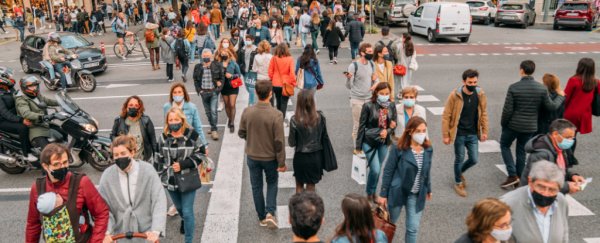The global pandemic is not yet over. Public health experts suspect it will last at least another five years, but how this ongoing crisis plays out is ultimately up to us.
A new report from the International Science Council (ISC), an international organization who's aim is to unite scientific bodies around the world, has laid out three scenarios that could occur by 2027.
The report was written by a panel of 20 experts on public health, virology, economics, behavioral science, ethics, and sociology.
While their commentary isn't an attempt to predict the future, their report helps narrow down and illustrate some of the possible actions the world can take to minimize the pandemic's impact going forward.
In the coming years, improving vaccine development and distribution could help the SARS-CoV-2 virus reach low endemic levels, with only limited, controlled transmission in most countries.
Scenario one
If the percentage of people fully vaccinated against COVID-19 increases from roughly 61 percent of all adults to over 80 percent globally, many lives could be saved and the risk of emerging variants could be reduced. In turn, there could also be benefits for mental health, the economy and sustainable development.
Even in this optimistic scenario, the coronavirus won't disappear, but its spread will become far more manageable.
In all likelihood, however, that's not where we're headed. The ISC report argues that governments have so far prolonged the pandemic by focusing on national strategies instead of international collaboration.
Scenario two
Our lack of action so far instead suggests a more likely result is that vaccination rates remain below 70 percent worldwide. If they don't increase, the novel coronavirus could become endemic with seasonal surges that would overwhelm hospitals in multiple countries and require "updated vaccines and the use of antiviral pharmaceuticals".
By 2027, the ISC report finds the most likely scenario is "an exacerbation of global inequalities". The United Nations' Sustainable Development Goals will be set back by a decade.
"The key lessons are, nonetheless, very clear. Even if the acute phase of the pandemic is winding towards an end in those countries with high vaccination rates, the risks will remain high while many in the world do not have access to an effective vaccine," the report concludes.
"New variants may yet emerge, and vigilance and ongoing vaccine and therapeutic development remain essential.There is no policy domain that remains unaffected, and governments must recognize that the pandemic's myriad impacts will not be resolved quickly. They must not pretend that the crisis is over just because mortality is reduced. For many citizens there will be many years of difficulties and challenges ahead."
Vulnerable people, like women, children and the elderly, will be most impacted. Meanwhile, low-income nations will face future health system collapse and growing food insecurity.
Scenario three
If nationalism and populism keep growing, the authors of the report worry that trust between governments and between states and their people will further deteriorate, reducing vaccine uptake.
They call this the "Missed Recovery" scenario. As geopolitical tensions grow, protectionist policies could seriously hamper global collaboration. The exact opposite of what is needed to deal with an international crisis.
In this worst-case scenario, less than 60 percent of the global population would be fully vaccinated against COVID-19, and low-income countries would still have limited access to initial doses and antiviral medicines.
"As a result, COVID-19 remains largely uncontrolled, with severe recurrences in parts of the world," the report reads.
To avoid a grim reality like that playing out, experts argue governments need to collaborate and invest in health care systems, integrate scientific advice systems, and address widening inequalities in education and wealth.
The ISC report urges governments to resist the temptation to cut climate targets for short-term gain.
It's possible that increasing climate change and environmental destruction will only make future pandemics more likely in the long run. And no one wants to go through this again.
"The COVID-19 pandemic has demonstrated the value of international scientific cooperation, even in the face of cascading environmental risks and geopolitical tensions," says Mami Mizutori, the United Nations secretary-general for disaster risk reduction.
"We must renew efforts to build a multilateral system that addresses inequalities while preparing us for the next crisis. Whether it be another pandemic, climate change, or conflict, we have the chance to learn from the last two years. If not, the Sustainable Development Goals will slip out of reach."
The report was published by the International Science Council.
